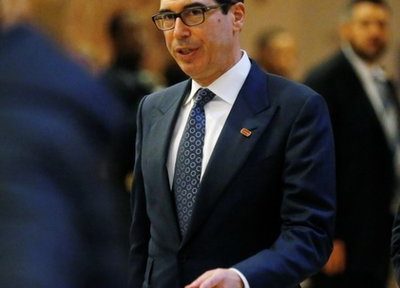- Home
- >
- Daily Accents
- >
- Mnuchin blames high-speed trading for the volatility of the markets

Mnuchin blames high-speed trading for the volatility of the markets

US Treasury Secretary Steven Mnuchin blames high-speed trading for the high levels of volatility we see in the stock markets. He added that he intends to launch a review of the market structure.
"Over a long period of time, markets are reacting to different economic components, but a normal trading day is now in a 500-point range due to the market structure and is something we will focus on." - said Mncuchin in an interview with Bloomberg.
He declined to comment on other possible reasons for market outlets, saying he would not want to comment on the economy before the FED official meeting. Mnuchin said he would ask the Financial Stability Oversight Council to look at the recent market volatility. While ruling early for the main reason behind volatility, he will still wait for the commission's official statement. "I think the combination of HFT and non-compliance with Volcker Rule is the cause of market volatility."
Undoubtedly, however, American shares have undergone significant fluctuations during Donald Trump's mandate at a time of negative comments to the Fed and the ongoing trade dispute between the US and China, as well as a period of possible stoppage of the government's work. However, the rise of high - frequency traders was a decade ago, and Volcker 's rule has been updated since 2013. This year, we witnessed aggressive movements in the indices. By comparison, 2017 has been the quietest since 1990, according to the CBOE Volatility Index.
Mnuchin's statement was enough to drag stocks from the downside, including those of Virtu Financial Inc., which closed 4.4% down. Spots also hit the Intercontinental Exchange, Nasdaq and CME.
Volcker Rule
The Volcker Rule, named after one of the previous FED chairmen, Paul Volcker, is one of the most significant and controversial regulations in response to the 2008 crisis. According to the Ordinance, banks are prohibited from using their own capital for speculative positions in the markets and they have a limitation on investing in hedge funds and private equity companies.
But Wall Street has for a long time been opposed to this regulation. According to market participants, it is unnecessary and too complicated, and it is almost impossible to adhere to it, especially for banks to confine themselves to executing transactions on behalf of their clients. In particular, these concerns by the Fed and other regulators are working on improvements to the original version of the Volcker rule.
In the last ten years, the issue of HF traders has changed from a disguised problem for the market structure to a highly debated issue of whether a trader "armed" with a computer and a set of algorithms can generate strong volatility.
High-frequency trading
When regulators took tightening measures on HFT, they faced strong resistance from the sector. In 2014, a serious investigation into high - frequency trading was launched for the first time by SEC chairman Mary Jo White, who prior to handing over the post in 2016, admitted that it was quite difficult to find a solution for the problem of high frequency trading. The main regulator of Wall Street has not yet created a significant framework of rules that endeavors to cover this type of trading. The reason for the SEC is still not progressing is the claim that they would rather hurt such a change in high-tech markets than to contribute with good.
Source: Bloomberg Finance L.P.
Photo: Twitter
 Trader Martin Nikolov
Trader Martin Nikolov Read more:
If you think, we can improve that section,
please comment. Your oppinion is imortant for us.











